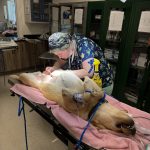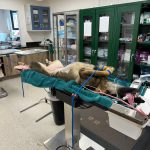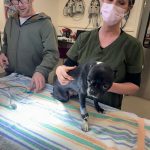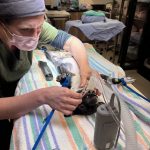Hello,
If Your dog ate a small mouse that was alive he will probably be fine. If the mouse was dead I would worry that it might have been poisoned.
My almost 2 year old dog has started to nose his way out the door when I leave the house. This has only been going on for about a week. There are two people who live in the house with him. This problem started when I was leaving for a weekend. His other person was here for the whole time I was gone I have been gone for weekends before. I need help to try to stop this behavior so we don’t have to keep him locked in part of the house so we can get out or in the house.
Please help
Comments
My dog ate a small mouse! Is this normal, and should I be worried?
Comments
Good evening. Before reaching out and scheduling an appointment with vet in the morning. I will ask here.
We have a 9 year old Sharpei-Hound mix named Emma, that has had a significant change in personality with-in the last 3-4 days. Overall her “Normal” behavior is what you would imagine with a blood hound; laid back and basically lazy. But when she’s outside her Sharpei side shows; playful but a little more on the aggressive side.
We have a fenced in property, and ability to closely monitor her and our other dog; a 12 year Chocolate Lab. With that said, 1 week ago February 25th we were going through our bedtime routine. Both dogs went out. Our Lab came back in rather quickly, but Emma stayed out a little longer before making her way back to the door.
When she came inside, she was shaking very much and appeared traumatized. My wife and I attempted multiple times to check her over and give her some love. But very unlike herself she did not want any part of it. She had No signs of cuts or abrasions or any type of trauma. But the only thing was when we touched the top of her head more over her left side she would yelp and whimper.
The next day she was back to her normal self. Only with in the last 3-4 days we are noticing some rather concerning things with her. That has never been previously observed.
1.Today she has developed a lump about the size of an acorn on the top of her head and still cries out when touched.
2. Appetite has not diminished, but she has had an increase in amount of water drinking.
3. She seems to be having trouble hearing.
4. Significant “Spotting” the last 3 days. This has never occurred before. And yes she is spayed.
5. Tonight when letting the dogs out after supper, I found Emma sleeping on her bed but with her eyes wide open and shallow breathing. I initially thought she had passed away suddenly, but after jolting her she awoke and came to in this rather “dazed and confused” state.
6. I would say that she is a slightly lethargic, she still wanted to go out and play but was more stand off-ish when around other dog and kids.
As stated we found no signs of being bitten by another animal, and until within the last day or so she has been her normal self. She has no underlying health problems, and is very active for being 9 years old.
We will be setting up an appointment, but in the meantime looking for help or assistance of others who have experienced this with their dog.




























I’m not sure what your question is.
Are you worried about him escaping while you are out? If so then I do think that placing him in a cage while you are away is the safest thing to do. If you are away all weekend and this is your dog and your responsibility for his care and safety then this is another question you must answer as his primary care giver. If you share custody of this dog with someone in the house then I think you both need to sit down and discuss the situation.
It sounds like your dog knows you are leaving and is upset about it. We don’t want to discourage that kind of loyalty and love do we?
How is the dog getting out? At what point of your departure is he leaving? I suspect this needs to involve a behavior change in the humans as well as the dog. Reevaluate HOW you leave, and what you focus on as you’re leaving. Make sure the door is closed securely when you leave. If the door doesn’t close securely, look into fixing that issue.
I would also make sure the dog understands that we don’t go outside without a person. Take the dog outside, spend time outside with him, and bring him back inside when you come back in. (Dogs shouldn’t be unattended outside anyway, so this is a safety thing beyond training.) Work on barrier training – train the dog not to cross exterior doors without being told to do so. Look for a training club to find a good trainer to help you work with this issue. (In the Baltimore area we have Oriole Dog Training, which offers a wide array of training classes. Most major cities have at least one training club.)
Thank you for your comments. He tries to get out as we open the door to leave. For almost 2 years we have always have him sit and stay telling him we love him and will be back. My question is how do I stop this behavior. He is way to strong for myself with a shoulder injury to walk him so taking him even to the car to take him for training is not what I can do or even afford. Just looking for an idea
The other person isn’t willing to work with him?
Making a big deal out of leaving is part of the issue. I have a shelter mutt who came to us with some separation anxiety (on top of everything else) and she absolutely door dashed when we first got her. We built a routine of giving a high value dental chew just before we leave, and we require her to go to place (go to her bed) before she gets it. Until he has a better grasp of not door dashing, use a barrier! Baby gates are relatively expensive and very, very useful. Crating is also a good skill every dog should have, and should be practiced regularly – don’t discount this as an option.
There’s a LOT of training you can do at home. I mentioned a local training club for the widest variety of training options available, but you don’t necessarily need to go someplace to get a trainer in your home. Additionally, you can investigate Denise Fenzi’s dog sports university online at https://www.fenzidogsportsacademy.com/
Thank you again. My dog is a very larg boy! He seems to be getting a little better! ( he dies not like the door being closed) . The other person ( my brother who is his actual owner) does work with him just not enough to my liking. The dog and I play out in the yard all the time. We are going to try again this weekend to see if the behavior is better. I just can’t do it by myself.
Set up a daily training routine with him. At least 5-10 minutes a day will work WONDERS for his overall behavior.